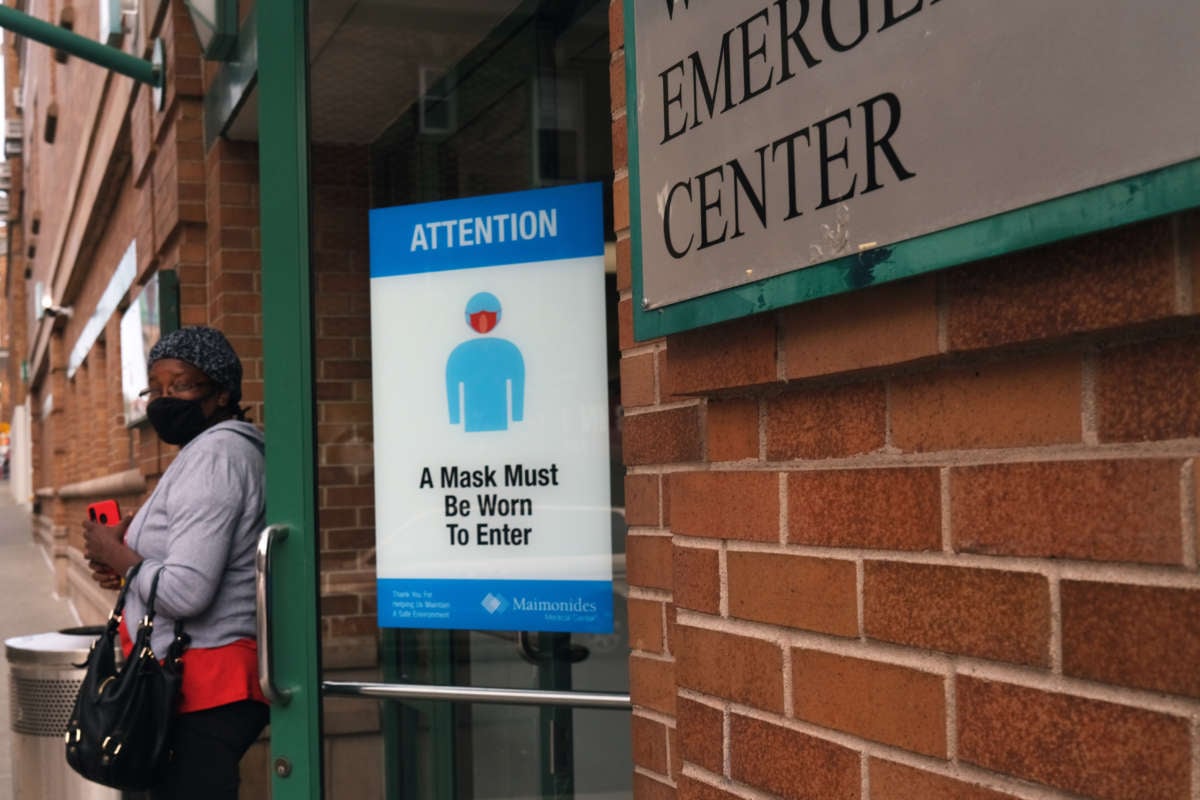Did you know that Truthout is a nonprofit and independently funded by readers like you? If you value what we do, please support our work with a donation.
As surging coronavirus hospitalizations across the U.S. push already-strained medical facilities to the brink of full capacity, internal documents obtained by NPR show that the Trump administration is withholding from the public critical hospital data that experts say would be extremely useful in helping communities prepare for, track, and overcome Covid-19 outbreaks.
NPR reported Friday that the documents — which are based on hospital data collected and analyzed daily by the Department of Health and Human Services (HHS) — “highlight trends in hospitalizations and pinpoint cities nearing full hospital capacity and facilities under stress. They paint a granular picture of the strain on hospitals across the country that could help local citizens decide when to take extra precautions against Covid-19.”
“The documents show that detailed information hospitals report to HHS every day is reviewed and analyzed — but circulation seems to be limited to a few dozen government staffers from HHS and its agencies, including the Centers for Disease Control and Prevention and National Institutes of Health,” NPR noted. “Only one member of the White House Coronavirus Task Force, Adm. Brett Giroir, appears to receive the documents directly.”
Dated October 27, the most recent internal report obtained by NPR shows that around 24% of the nation’s hospitals — including facilities in major cities like Atlanta and Minneapolis — are utilizing more than 80% of their intensive care unit capacity and names specific hospitals that are over 95% capacity. The document also shows an uptick in ventilator usage over the past month as coronavirus infections continue to rise at a record-shattering rate.
Experts said the detailed local data currently only circulated among a small group of Trump administration officials would, if made widely available, play a significant role in better informing Americans and health officials about nearby hotspots and encouraging greater safety precautions.
“The neighborhood data, the county data, and metro-area data can be really helpful for people to say, ‘Whoa, they’re not kidding, this is right here,'” Lisa Lee, former chief science officer for public health surveillance at the CDC, told NPR. “It can help public health prevention folks get their messages across and get people to change their behavior.”
While some state officials are able to access HHS reports for their own state, the inability to view broader regional data leaves them without potentially crucial information.
“Hospitals in Tennessee serve patients who are from Arkansas and Mississippi and Kentucky and Georgia and vice versa, and so we’re a little bit blind to what’s going on there,” said Melissa McPheeters, adjunct research professor of health policy at Vanderbilt University Medical Center. “When we see hospitals that are particularly near those state borders having increases, one of the things we can’t tell is: Is that because hospitals in an adjacent state are full? What’s going on there? And that could be a really important piece of the picture.”
Ryan Panchadsaram, co-founder of the website Covid Exit Strategy and a former data official in the Obama administration, said the decision to keep the detailed hospitalization data out of public view is “reckless,” particularly in the face of soaring coronavirus cases and hospitalizations nationwide.
“It’s endangering people,” Panchadsaram told NPR. “We’re now in the third wave, and I think our only way out is really open, transparent, and actionable information.”
In a tweet Friday, Panchadsaram wrote that “there’s a mismatch: the rigorous work that’s happening internally by the rank and file at HHS/CDC/USDS [United States Digital Service] and what is being shared externally by the administration.”
According to publicly available data analyzed by the Covid Tracking Project, more than 46,000 people in the U.S. are currently hospitalized due to the coronavirus as of Thursday, which saw a daily record of 90,400-plus new cases.
“Approaching the eve of the election, President Trump has downplayed the steep rise in cases, attributing much of it to increased testing,” the New York Times noted earlier this week. “But the number of people hospitalized for the virus tells a different story, climbing an estimated 46 percent from a month ago and raising fears about the capacity of regional healthcare systems to respond to overwhelming demand.”
Dr. Leana Wen, an emergency physician and visiting professor of health policy and management at George Washington University’s Milken School of Public Health, tweeted Friday that the HHS hospitalization data “needs to be available to the public.”
“It is critical to hospital surge planning and guiding local and state policies,” said Wen.
A terrifying moment. We appeal for your support.
In the last weeks, we have witnessed an authoritarian assault on communities in Minnesota and across the nation.
The need for truthful, grassroots reporting is urgent at this cataclysmic historical moment. Yet, Trump-aligned billionaires and other allies have taken over many legacy media outlets — the culmination of a decades-long campaign to place control of the narrative into the hands of the political right.
We refuse to let Trump’s blatant propaganda machine go unchecked. Untethered to corporate ownership or advertisers, Truthout remains fearless in our reporting and our determination to use journalism as a tool for justice.
But we need your help just to fund our basic expenses. Over 80 percent of Truthout’s funding comes from small individual donations from our community of readers, and over a third of our total budget is supported by recurring monthly donors.
Truthout has launched a fundraiser to add 310 new monthly donors in the next 4 days. Whether you can make a small monthly donation or a larger one-time gift, Truthout only works with your support.
